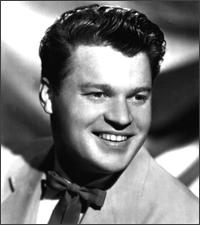Rusty Draper was a popular singer during the 1950s who had a number of hits on both the pop and country charts. He was born Farrell H. Draper in Kirksville, Missouri and became interested in music after his father gave him a guitar on his tenth birthday. He made his radio debut at age 12 in Tulsa on the Cy Perkins Show, hosted by his uncle Ralph Powell. Soon afterwards, Draper began working at a Des ... Read MoreRusty Draper was a popular singer during the 1950s who had a number of hits on both the pop and country charts. He was born Farrell H. Draper in Kirksville, Missouri and became interested in music after his father gave him a guitar on his tenth birthday. He made his radio debut at age 12 in Tulsa on the Cy Perkins Show, hosted by his uncle Ralph Powell. Soon afterwards, Draper began working at a Des Moines station, where he often filled in for sportscaster (and future President) Ronald Reagan.
When Draper was 18, he moved to San Francisco, where he began performing at the area club the Barn; legend has it that a Navy officer was so impressed with Draper's singing that he refused to pay his $75 tab until the owner hired the singer full time, where he soon became one of the club's biggest draws. He then went on to spend eight years playing at the Rumpus Room, where he met Marcia Wilsey, who became his wife and manager and got him guest appearances on several television shows, including The Ed Sullivan Show and Arthur Godfrey's Talent Scouts. Draper had just signed with Mercury when his wife arranged a national tour of clubs and theaters; while he toured, his second single "Gambler's Guitar" hit the country Top Ten and crossed over to the pop charts as well.
In 1955, Draper scored three Top 20 pop hits, and between 1956 and '57 had five more. His next hit came in 1960 with a version of "Muleskinner Blues." He scored his final pop hit with a cover of Willie Nelson's "Night Life." In 1968, he returned to country with a Top 60 hit, "Buffalo Nickel." In the years that followed, Draper continued to perform in clubs, write songs, and appear on TV. He spent seven years as the "singing emcee" at the Mel Hertz Club in San Francisco, and returned to the charts one final time in 1980 with "Harbor Lights."
